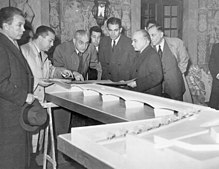Edgar Cardoso
Edgar António de Mesquita Cardoso (born May 11, 1913 in Porto , † July 5, 2000 in Lisbon ) was a Portuguese bridge engineer.
Life
Born in Porto to a Portuguese officer and mining engineer and a wealthy Brazilian woman, he spent the first part of his childhood there before moving to Lisbon with his family. At the age of eleven, he moved back to Porto with his parents and six siblings. His father, last with the rank of major , was transferred to the reserve in 1924 and became director of the state road administration Junta Autónoma de Estradas (JAE). After graduating from Liceu Alexandre Herculano in 1931, Cardoso followed in his father's footsteps and enrolled in the engineering faculty of the University of Porto .
After graduating in 1937, he took up a position at JAE in the bridges department. In addition to planning and building bridges, he increasingly devoted himself to research and innovation. Parallel to his public employment, he was also active in the private sector; he opened his own office in Lisbon in 1944. His academic career also developed increasingly, especially from 1951, when he accepted a professorship at the Instituto Superior Técnico (IST). As a result, his commissioned work also increased significantly. Was known u. a. his construction of the Ponte da Arrábida in Porto, which at that time was the largest reinforced concrete arch bridge in the world. In addition to numerous projects in Portugal and the Portuguese colonies at the time , he was also active internationally, for example in the planning of bridges for the construction of the expressway in Barcelona in 1969, or in Italy in 1974 when discussing the planning of the bridge over the Strait of Messina .
After the Carnation Revolution in 1974, he was forced to resign from his academic duties because he was accused of supporting the authoritarian Estado Novo regime. From 1979 until his retirement in 1983 he worked as a professor again. He received a remuneration of one million escudos for the period from 1974 to 1979, which he left to government agencies, which then founded the Edgar Cardoso Foundation, which has since awarded scholarships and research prizes at the IST.
The Ponte de São João railway bridge in Porto was his last project of his own in 1991. After that, he only worked occasionally and in an advisory or participating role, for example in the expansion of Madeira Airport (opened in 2000).
In 2000 he died in Hospital Pulido Valente in Lisbon. He had been married to Margarida Congeol since June 7, 1941 and had no children.
reception
Today Cardoso is regarded as an innovator in bridge construction, whose constructions are known for their lightness and filigree beauty. He was voted 87th in the 2007 poll by the public television broadcaster Rádio e Televisão de Portugal for the greatest Portuguese of all time ( Os Grandes Portugueses ).
He was an honorary doctor of the Universidade Federal do Rio de Janeiro .
Works (selection)

- Reinforcement and widening of the Ponte D. Luís I in Santarém (1959)
- Ponte da Arrábida in Porto (opened in 1963)
- Bridge over the Limpopo in Xai-Xai , Mozambique (opened in 1964)
- Ponte Almirante Sarmento Rodrigues in Barca d'Alva (opened in 1967)
- Ponte Samora Machel in Tete , Mozambique (opened 1973)
- Ponte Governador Nobre de Carvalho in Macau (opened 1974)
- Ponte Edgar Cardoso in Figueira da Foz (opening 1982)
- Ponte de São João in Porto (opening 1991)
Web links
- Biography on the University of Porto website (English and Portuguese)
- Edgar Cardoso at Structurae (English)
Individual evidence
- ^ A b University of Porto Famous Alumni: Edgar Cardoso. University of Porto , accessed August 26, 2012.
- ↑ Os Grandes Portugueses: 90 maize. RTP website (Portuguese) ( Memento of 7 July 2011 in the Internet Archive ).
- ↑ Manuel de Azeredo: Edgar Cardoso. Biography on an employee website of the University of Porto, accessed on May 3, 2017 (Portuguese).
| personal data | |
|---|---|
| SURNAME | Cardoso, Edgar |
| ALTERNATIVE NAMES | de Mesquita Cardoso, Edgar António (full name) |
| BRIEF DESCRIPTION | Portuguese bridge construction engineer |
| DATE OF BIRTH | May 11, 1913 |
| PLACE OF BIRTH | postage |
| DATE OF DEATH | July 5, 2000 |
| Place of death | Lisbon |
